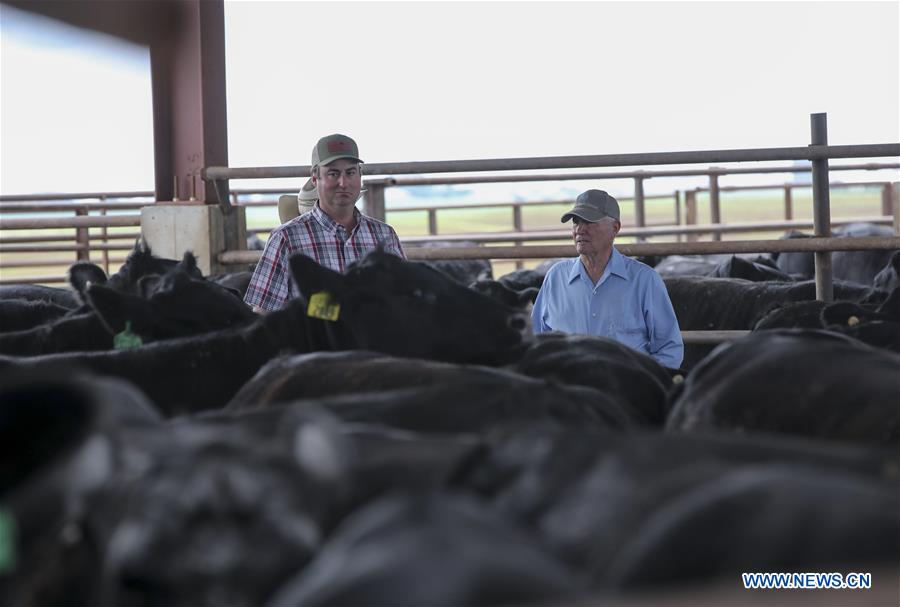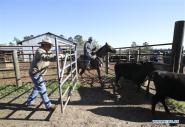U.S. farmers frustrated by damage caused by tariff uncertainties
From cattle feeders in Iowa to pecan growers in Georgia, U.S. farmers are worrying about further damage caused by market uncertainties as trade tensions between the world's two largest economies drag on.
DOWNWARD PRESSURE MAKES EXPANSION IMPOSSIBLE
In the last couple of months, the beef markets have "been getting cheaper for us. So we need to have some market stabilization and hopefully (they) go back up for us to do a little better," said James Vaughn, a farmer from Forsyth, Georgia.
Vaughn, whose beef operation includes 407 purebred Angus cows, was visiting his business partner -- feedlot operator Bill Pellett in Atlantic, a small city in the Midwestern state of Iowa.
"I attribute it (the lower price of beef) mostly to uncertainty, some of the economic uncertainty is being caused by the tariffs," Vaughn, who was the 2018 Georgia Farmer of the Year, said in a recent interview with Xinhua.
Since the mid 1990s, he has been marketing cattle to Pellett. After the cattle is finished in the feedlot, the meat is sold to export markets.
A deal to re-open the Chinese market for the U.S. beef was reached in June 2017, Vaughn recalled. "We were very excited about the prospect of (entering the Chinese market), we would like to be able to expand our business at home."
However, the beef export to China actually "stopped" after the United States initiated the tariffs battle against China, according to Vaughn's understanding.
"China seems to me to be a very large potential market. I would very much like to be able to do business," said Vaughn.
"But we're getting the downward pressure on prices that makes it impossible for us to expand," he added.
Pecan farmers in his home state Georgia are among the hardest hit by the unwanted tariffs, Vaughn pointed out.
There was "a lot of expansion due to the Chinese demand for the pecans. And that market is gone and it's severely impacted the price for them," he said.
China was the biggest consumer for U.S. pecans last season, buying one-fifth of the U.S. supply and nearly one third of all U.S. exports.
The potential loss of the Chinese market for U.S. pecans is most worrisome, Vaughn noted. "So I know they would like to get this (trade tension) resolved quickly."
TO HAVE TRADE WHERE IT WAS
"I'm also a lawyer. During my law practice for 35 years, I've always tried to get people to solve problems and not fuss about them," Vaughn said. "Because when they fuss about them, it just causes more problems and it causes lasting problems. That's not good. We don't need to be fussing. We need to trade, right?"
The 71-year-old Pellett cannot agree more with his longtime business partner.
"So let's look at the big picture, not our petty differences. By working together, we can solve those issues more quickly and more beneficially," Pellett told Xinhua.
The fifth-generation farmer has been producing corn, soybeans and beef at his 6,000-acre family farm. The family produces 768,000 bushels of corn and 190,000 bushels of soybeans annually while raising nearly 2,000 head of cattle.
Pellett said they were "blessed to be able to get our crops in a very timely manner" while there are a lot of states that "are way behind" because of heavy floods and excessive rain.
The record-breaking wet conditions have led to a record-low amount of acres planted with corn and soybeans, according to the U.S. Department of Agriculture (USDA).
Pellet said, "There will be a lot of farmers that will be in very bad shape at the end of the year, just due to the weather conditions that have existed this spring and may continue."
Apart from enough sunshine, what the U.S. farmers need most is apparently a quicker deal with their major trading partners including China.
American farmers "are one of the casualties here with trade disruption," U.S. Agriculture Secretary Sonny Perdue told the cable news CNN recently.
"I've told the President -- and the President understands -- you can't pay the bills with patriotism. We know that, and certainly he knows that. That's why he's trying to supplement the damage they're having from trade disruptions with market facilitation," Perdue said.
Over the last decade, China's purchases of U.S. soybeans have averaged annually 11.3 billion U.S. dollars in sales, showed official data. In 2018, soybean exports to China totaled 3.1 billion dollars, a drop of nearly 75 percent from 2017.
In May, Perdue announced a 16-billion-dollar package of farm aid payments to help offset losses endured by U.S. farmers.
The package followed an earlier 12 billion dollars in aid the Trump administration dispensed last year through the new Market Facilitation Program, which was aimed at compensating for the losses incurred as a result of the trade disputes.
The aid is "only a short-term fix" for a very long-term problem as it fails to provide "predictable, consistent and adequate relief" across the U.S. agriculture, Roger Johnson, president of the National Farmers Union, has said.
"It's never enough. I mean, we can't afford to do everything for everyone ... If you get 20,000 dollars, you know, say from the aid program, it will pay off a little bit. But it still is hurting not to have the trade where it was," Pellett said.






